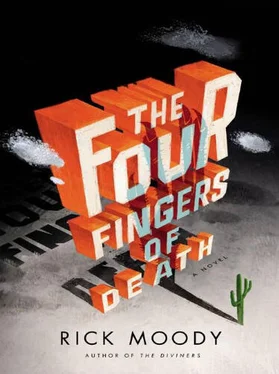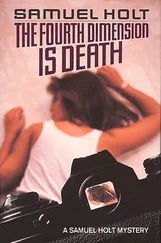Rob rubbed ruminatively at his eyes, gazing upon what he thought he knew, in the whispered hum of the desktop system that was doing the projecting, and he didn’t even hear Debra Levin, who may have been in the room ever since, throughout his calculations, throughout his elegiac flights of ratiocination. She was here still, putting a well-manicured hand on his sweaty, unwashed shoulder. He started, and gazed into her benevolent and not-to-be-trusted face.
“Whatever you need,” said Debra Levin, sadly smiling. Leaving her hand there a moment longer for additional emphasis. By the time he’d finished parsing and reconsidering this simple phrase, she was gone.
Noelle Stern, graduate student in the medical school at URB, assistant to world-famous researcher Woo Lee Koo, had experienced the blinding light of revelation . In a way she had never suspected or believed possible. Since, like Koo, she dead-reckoned with the certainties of empirical research and experimental method, she rarely predicted surprise, and this despite her youth in the hothouse of alternative belief systems, Rio Blanco. And yet: against her better judgment she had come to believe that the animals in the URB animal research laboratory were speaking to her.
She was a tiny woman, just a hair over five feet, who wore jump boots and torn jeans and whatever monochromatic sweater she could buy at the thrift stores of Fourth Avenue, a look that her boss, Dr. Koo, had suggested would be inadequate to professional advancement. Her hair of dirty straw she kept often in pigtails, and it was as if it had never occurred to her to clean the lenses of her secondhand spectacles. Hobbies as follows. Sundays, she took lessons in contortionism west of the city with members of the omnium gatherum . For a long time, she’d also played old-fashioned laptop in a band called Momento Mori, but she’d quit because they had insisted on getting a manager. She read widely and wanted to learn Italian. If there had long been an ideological divide between her inherited (from her dad) desire to study in the field of medicine and the heavy drumbeat of left-of-ideological-center Rio Blanco, where she had lived the whole of her short life — a town of easy, relaxed pastimes, including public drunkenness and intoxication with polyamphetamine and OxyPlus (via nasal inhaler) — it had never seemed to amount to a state of irreconcilable conflict until such time as her boss, Koo, began messing with the higher primates.
Koo, as even she would put it, was a runty type from South Korea who had a chip on his shoulder about that land of fraudulence. He had been recruited to URB to study stem cell theory. And he did a little of that. But he indicated that stem cell theory was complex and required more and better animals than were presently available at the school of medicine. Right after she’d been assigned to him, he started trolling message boards looking for apes with neurological complaints. Any ape with a tremor or paralysis was placed in the database she’d created for Koo, and in many of those cases, he’d made direct attempts to purchase. To animals who were, on the contrary, able-bodied, he would occasionally apply enough electrical impulses to their spinal columns to induce paralysis. URB would have become the world’s leading facility for afflicted apes, all of them palsied, trembling, lying inert on the floors of their cages, if not for the fact that (in addition to Koo’s inconstant attentions) URB was going through a period of fiscal whatever you’d call it. Successive state budgets had brought about such reduced circumstances that Koo was trying to make up the difference from national granting agencies who were themselves scrambling for dollars.
The way Noelle saw it, there was no oversight from the university. Nor from the medical school. And Koo didn’t seem as if his heart was in stem cell research any longer. Koo failed to teach his classes, delegated to the teaching assistants all the lecturing, took no interest except at exam time. That wouldn’t have been unusual had he been in the laboratory instead. But he wasn’t in the laboratory, except late at night when no one else was around. In his accented English, Noelle understood him on occasion to be mixing heavy doses of Catholic imagery with his convoluted instructions about what to do with the experimental results. He kept talking about reanimation and regeneration and necrotic tissue , areas of medical intrigue she associated with the realm of the imaginary.
She had herself kicked upstairs with the animals because if she was going to work for a flake, she wanted to be working on the fun stuff. She probably could have been reassigned to another professor, because she hadn’t even bothered to come up with a dissertation topic yet. Graduation just wasn’t much of a goal. Still, Koo, for all his apparent strangeness, was mostly formal and polite, and seemed to take a real interest in her well-being. He invited her to dinner at his home (a dark, mostly unfurnished unit in a development in the western hills), not just to the departmental trips to the bar, which were stiff and forced. One time, Koo had asked Noelle for her advice in dealing with his son, Jean-Paul, who, like all the other Anglo kids in Rio Blanco, was going through a period when he believed he was a Latino gangster. It was all about the algae-fueled vehicle and the baggy clothes and the T-shirts depicting Mexican wrestling personalities. She remembered Koo’s expression as he asked for help, and it was of total noncomprehension. He still loved his boy. This was clear. She’d said that she’d look in on Jean-Paul from time to time, but every time she tried, the younger Koo found a way to cancel at the last minute or to bring along a friend. He was, however, conscientious about sending her the occasional grammatically incorrect text message.
Generally speaking, Noelle had problems with men. There was always some guy in sandals and dreadlocks whom she was trying to avoid but whose telephone calls she was still waiting for. She waited long enough that she could watch her impressions of the man in question go from unreasonable appreciation to doubt to contempt. Sometimes in the space of days. She hadn’t even slept with him yet, whoever he was. Jean-Paul, in his refusal to interact, was consistent with earlier findings, and he was just a kid.
These and other difficulties improved when she started working with the primates. Runaround Sue was her first charge, an ill-mannered chimp from Saint Louis, MO. She’d been born in captivity there, had never swung from the tree branches like a chimpanzee ought in the Congo. Runaround Sue specialized in eating and watching television, and in threatening whatever human being was responsible for her by baring her teeth. According to reports from Saint Louis, Sue had never once been a chimpanzee of status in the group. Other women chimps ignored her. She ate and slept and, on occasion, copulated with lower-status males. Such was the life of the prisoner.
The Runaround Sue who arrived in Rio Blanco had some kind of relapsing and remitting neurological complaint. Maybe her aggressiveness was meant to deflect attention from her weakness. Noelle had trouble not projecting her feelings onto the chimp. She even took umbrage at Sue’s name, which had been bestowed on her because despite her status she had been good at mating in captivity and producing children, most of them now full grown and removed to medical facilities elsewhere. Noelle hated Sue’s name, but she sympathized, as she also understood when Sue was prideful and confrontational at the moments when pity and sympathy were coming back at her.
Sue, like the apes who would follow her at URB, was not an alpha animal. The chimps at URB had lots of scars and were missing fingers, had chronic diarrhea, or were, apparently, parkinsonian. These were the animals that had already exhausted the patience of researchers across the country. Noelle loved the outcast apes, though, and spoke to them with tolerance and equanimity. She said to Runaround Sue, e.g.: “You can’t believe what they got up to at the omnium gatherum this weekend. They’re trying to dig a hole from here to Mexico. Fifty-eight miles. They were saying a blessing for the digging, and there was some kind of traditional ritual with tortillas. The earth movers are going to have to go down like fifty feet or something to be below the level that the border patrol uses. They had a shaman dig the first shovelful. And then he broke up some tortillas and handed around crumbs.”
Читать дальше












